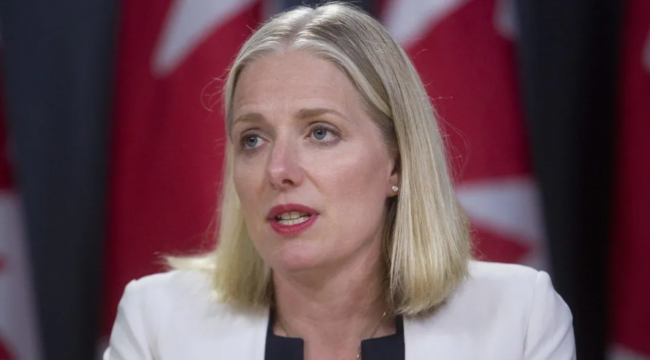Articles Menu

If found to have breached competition law, the oil companies could face a fine of up to three per cent of their worldwide revenues, or more than $9 billion.
Filed by Greenpeace Canada, the complaint targets the “Let’s clear the air” ad campaign that appeared as full page ads in newspapers, including the Star, TV commercials, social-media posts, billboards and podcasts, in which the six largest oilsands producers claimed they are “making clear strides toward net zero” and that they will “help our country achieve a sustainable future.”
Former federal environment minister Catherine McKenna, now the chair of the United Nations Net-Zero Expert Group, said in the release: “If you put your hand up and claim you’re a climate leader, there is a price of admission — you need to do the work.”
At last fall’s COP27 climate summit, McKenna unveiled the United Nations’ new principles for net-zero commitments, designed to put an end to greenwashing and used the opportunity to single out oil companies.
“We will continue to speak on behalf of one of Canada’s most important industries and show how we’re addressing the climate challenge.”
Greenpeace’s filing is the most recent in a series of complaints made to the Competition Bureau against fossil fuel companies accusing them of greenwashing their businesses. Last fall, the Canadian Association of Physicians for the Environment (CAPE) alleged that the Canadian Gas Association’s claims that natural gas is safe for your health, environmentally friendly and affordable are “false and misleading.”
CAPE has also signed onto the new Greenpeace complaint.
The complaint says the Pathways Alliance’s net zero claim fails to account for consumers’ burning of the oil they produce, which accounts for more than 80 per cent of emissions. The net zero goal also relies on a plan “based on untenable and not established assumptions about future technologies,” like carbon capture, usage and storage (CCUS) that has never been deployed at the scale proposed.
The ads, which ran during the World Cup, the Australian Open and the Super Bowl, do not mention that the oilsands companies are expanding production and increasing their emissions, which have more than doubled since 2005, reaching a record of 86 megatonnes in 2021 — more than 12 per cent of all greenhouse gas emissions emitted nationwide.
“They give the impression that the Pathways Alliance is a climate leader and that their actions will clear pollution when they are not taking actions that do so,” Greenpeace said in the release.
In an interview with the Star earlier this month, federal Environment Minister Steven Guilbeault said oil companies have failed to reduce their emissions on their own and pledged to “force” them to bring them down through a hard cap on emissions in the sector.
The entire oil and gas industry, including businesses refining and transporting oil but not burning it, accounts for more than 27 per cent of Canada’s annual carbon footprint, according to early estimates put out by the Canadian Climate Institute.
As emissions in the oil sector have risen, so have their profits. The six members of the Pathways Alliance made a record high $35 billion in profit in 2022, but spent only $500 million on their net zero plan.
Instead, the companies devoted far more money to share buybacks ($32.1 billion), which boost the stock price, and dividends ($16.7 billion), which are direct cash payments to shareholders.
Meanwhile, the alliance has said the federal government’s announcement of more than $8.6 billion in public subsidies is not enough to go ahead with their CCUS project, with one CEO saying the industry needs “more help.”
Ever since the United States passed its Inflation Reduction Act, which includes generous subsidies for reducing emissions in the oil and gas sector, Canadian oil companies have pushed for additional public funds.
But a report put out this week by the Canadian Climate Institute and the Pembina Institute concluded that there are already more supports for CCUS in Canada than there are in the U.S.
Greenpeace also highlighted the fact that Pathways Alliance members have lobbied governments and opposed emissions regulations. The UN net zero principles that McKenna helped develop explicitly prohibit companies from lobbying to undermine climate policies.
If the Competition Bureau upholds the complaint, Greenpeace wants the fine to be given to the Environmental Damages Fund and paid to organizations, preferably Indigenous-led, to clean up oilsands pollution.
The federal government pledged this week to investigate how a leak of toxins from an oilsands tailings pond went on for more than nine months before Pathways Alliance member Imperial Oil informed local First Nations who drink and fish in nearby waterways.